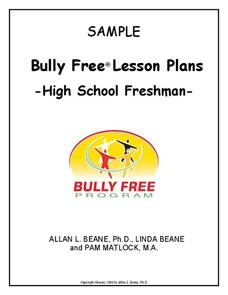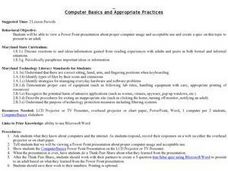It's About Time
States of Matter: Solid, Liquid, and Gas
Solid, liquid, and gas: they all matter. Scholars create an animation of the various states of matter, experiment with the temperature of water as it changes states, and observe carbon dioxide as it changes states. The lesson also...
Inside Mathematics
Quadratic (2009)
Functions require an input in order to get an output, which explains why the answer always has at least two parts. After only three multi-part questions, the teacher can analyze pupils' strengths and weaknesses when it comes to quadratic...
PBS
Stories of Painkiller Addiction: The Brain on Autopilot
For some people, the force of addiction can be as biologically compelling as the drive for food or water. High schoolers watch a video segment about Ryan, a recovering addict, and learn more about how opioids and other drugs can affect...
Curated OER
Transforming Energy
Super detailed, this lesson will educate physical science learners about the flow of electrons. Begin by reviewing potential and kinetic energy with a moving pendulum, and then get them online to observe interactive websites about...
Curated OER
Latch Circuits
In this circuit activity learners complete a series of short answer questions using circuit diagrams to show the input and output of different switches.
Curated OER
Purposes of Dating
So many options are included here for you to help your class explore dating, relationships, and types of love. These lessons are becoming more and more important due to media influences, so choose one of the 10 options to guide your...
Curated OER
Getting Parents On Your Side
Strong ties between parents and teachers produce a learning environment that benefits everyone.
Facing History and Ourselves
Taking a Stand: Models of Civic Participation
How does an individual take a stand for a principle or belief? what skills are required to do so? What are the challenges and risks in doing so? Class members study examples of individuals engaging in such activities and then identify...
Positively Autism
Primary and Secondary Color Worksheets
Here's a worksheet formulated for fun. Kids add two primary colors to produce a secondary color and record the results on train-themed worksheet.
Inside Mathematics
Graphs (2004)
Show your pupils that perimeter is linear and area is quadratic in nature with a short assessment task that requests learners to connect the graph and equation to a description about perimeter or area. Scholars then provide a...
Bully Free Systems
Bully Free Lesson Plans—Ninth Grade
"Bullying and Prejudice" and "Do You Cyber Bully," two lessons from a complete Bully Free program, serve as samples of the approach used in a unit designed to bring awareness to and to combat bullying. Each lesson asks class members to...
Generation Rx
My Generation Rx: Plot Twists
How can prescription drugs be dangerous if they were prescribed by a doctor? Is it okay to share your prescription drugs with friends if they really need them? Clear up any common misconceptions about prescription drugs with a set of...
California Department of Education
My Best Resume
For employers and recruiters, the first step in their quest to find good candidates is the paper screening process. They look at a candidate's application and resume and push forward the files of those who meet their requirements. Thus...
Curated OER
Beary Necessary Rules
Young pupils learn about classroom rules as they also practice active reading strategies and reading comprehension skills. This instructional activity begins with a thorough reading of the story Brown Bear, Brown Bear, What Do You...
Curated OER
Don't Let the Earth Down
Writing a persuasive argument starts with a clear thesis. Using this resource, your class will write a persuasive paper on a conservation issue. They will then transform their argument into a 30-second public service announcement. If...
Curated OER
Don't Let the Earth Down
Although recycling is definitely beneficial, reducing our waste and conserving our natural resources should really be the focus of environmentalists. Encourage the future generation to create a public service announcement about a...
Curated OER
Teaching About Tolerance Through Music
Explore the importance of tolerance with a music-themed lesson plan. Learners listen to the music of Peter, Paul, and Mary, and discern the underlying messages before discussing the painful effects of ridicule, disrespect, and bullying.
Curated OER
Invetories Slave owner or not?
Primary source analysis is a great way to bring history to life. Learners examine a series of personal inventories taken from Southern white males who died during the Civil War era. They analyze the documents to determine the social and...
Curated OER
Computer Basics and Appropriate Use
View this PowerPoint and go over the basic rules about computers. It is well-suited for all ages because the rules apply to all learners. Everyone benefits from knowing the terms for working with computers. But more importantly, make...
Curated OER
Beep! Beep!
First graders demonstrate knowledge of the difference between general and personal space, and ability to change speed on command. They demonstrate competency in motor skills and movement patterns needed to perform a variety of physical...
Curated OER
Terms in a Sequence
In this terms in a sequence activity, learners solve and complete 32 various types of problems. First, they simplify each of the equations listed. Then, students find the number of arrangements found using the information given. They...
Curated OER
All About Circuits ~ Atomic Structure
In this interactive Internet assignment, physical science investigators answer 11 questions about the atom, the subatomic particles, and atomic structure. They can click on "Reveal Answer" to discover if they are correct. They also...
Curated OER
The Right Choice
Have class discussions about decision-making and how to solve real life problems with your learners. They will watch videos, talk about truths, fill out outlines, and more.
Green Education Foundation
How Loud is Too Loud?
Ever wonder how loud a sound has to be to cause damage? Young scientists explore sound properties by researching decibel levels. They discuss how sound is perceived by our ears and our brains and why it can cause negative health effects...
Other popular searches
- Positive Behavior Lessons
- Positive Behavior Bathroom
- Positive Behavior Supports
- Positive Behavior Plans
- Positive Behavior Motivation
- Positive Behavior Drama
- Positive Behavior in School
- Positive Behavior Products
- T Chart Behavioral Positive

























